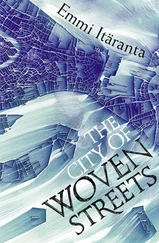The spines didn’t have dates, years or tea masters’ names on them, so I had to look for the right book for a while by leafing through the first pages of the leather-covered volumes. Eventually I found the one that had the years I was looking for written on the front page in unfamiliar hand.
I turned the page and began to read.
I drained the last drops from the teacup and placed it on the floor next to a pile of books. My neck ached. Weightless speckles of dead dust drifted in the shaft of sunlight filtering through the window. I moved the books that I had already searched and the notes I had brought from my mother’s study, then settled on my back in the empty space created on the living room floor and closed my eyes. A crease in my shirt caught under my weight pressed against my muscles. My thoughts swirled in a tight tangle, and every time I grasped one thread, attempting to follow it, the rest clenched into a more persistent knot.
I had spent the past two days reading the tea masters’ books, and so far I had leafed through seven of them from the Twilight Century. In the latter half of the century four tea masters had lived in the house. The first of them, Leo Kaitio, hadn’t cared much about writing. He had only filled one leather-bound book during his lifetime. The entries were brief and their content dry. ‘Rain this morning. The tea visit of Second Lieutenant Salo and his wife went as expected. Must remember to have shoes repaired.’ ‘January even warmer than last year. A crack in the earthenware teapot.’ I had needed to check in my mother’s old books to make sure I remembered correctly what January was: it had been the name of the first month of the year in the old solar calendar. Despite this complication, I had skimmed Leo’s notes quickly. Near the end of the book the handwriting changed, and it took me a while to understand the reason. To be certain, I had opened the next book in order, with the name Miro Kaitio scribbled on the first page. He was presumably Leo’s son. A quick glance at Miro’s handwriting confirmed my suspicions: the writing on the pages Leo had left blank in his book was likely to be Miro’s.
Miro had not inherited his father’s curtness, but had clearly spent a large chunk of his free time writing. He had filled six books with tiny handwriting and also scribbled notes on small pieces of loose paper folded between the pages. Some of his entries were undated. The section on the final pages of Leo’s book was one of those. There must have already been a shortage of writing supplies at the time. Miro had probably adopted his father’s book for perusal in some moment of despair when he had run out of paper.
Miro’s entries were completely different from Leo’s. He wrote about his thoughts and dreams, about his feelings during the tea ceremonies and outside them. He would write lists of things that made him smile (a cat curling in one’s lap, the first bite of a crisp apple, sun-warmed grass under one’s bare feet) and things that made him irritable (a chafing shoe, spectacles so old one can no longer see with them, running out of ink when one most needs it).
I opened my eyes and got up to my feet. I rose too quickly: the room darkened and I had to lean against the wall until I stopped feeling dizzy. I went to the kitchen and poured myself another cup of tea, which had grown lukewarm. I came back, sat down on a cushion and picked up the final one of Miro’s books, which I had only read halfway through. The pages felt fragile and dry against my fingers, as if they might fall apart, scattering the thin black words across the floor for wind to carry away. This link to the past was brittle and threadbare, like a bridge too weather-worn to cross safely. Yet the words themselves were strong. They drew me in so that I lost track of time and had to remind myself of what I was looking for. I was enchanted by the way this tea master who had lived long before my time described his days, his full moon nights spent awake, grains of sand scattered across the teahouse floor by visitors’ shoes, snow that melted immediately into glistening-dark earth and that some winters didn’t fall at all. These stories and fragments of a life long faded reaching to me from the yellowed, delicate pages were so luminous, so detailed and colourful that I couldn’t take my eyes off them. The bones of this man and the water in his blood had returned to earth and sky long ago, but his words and stories were alive and breathing. It was as if I myself lived and breathed more truly and inevitably while I was reading them.
Shadows changed outside, and I listened to the rustling of paper under my hands.
I didn’t close the book until there was barely enough light left to see the words. Bridges fell apart and past was once again barely more than a web of indiscernible words behind an opaque screen, and the silence of the house enclosed me. Another day was gone, and I had not found what I was looking for.
Before going to sleep I went out to rake the rock garden. The faint lines in the sand grew nearly invisible in the late evening. As I was finishing, I happened to glance at the road going to the village, and I thought I could make out two human shapes watching the house at the edge of the woods.
I froze, and my heart was beating in my chest.
The rake slipped from my hands. I squatted to pick it up from the sand, and when I straightened my back, the edge of the woods was empty and still.
The following morning I went to look for traces, but the hardened ground and the thick-scattered rug of pine needles didn’t reveal anything. In the dusk, the shadows of trees may look like figures that are watching relentlessly.
A couple of days later I got an unexpected message from my mother. I walked into the house with two skinfuls of water I had queued for in the village and saw the message-pod light flashing. I almost dropped the skins to the floor and rushed to switch the pod on. The display lit up and I read my mother’s round, rolling handwriting.
Dear Noria, she wrote, I’m sorry I haven’t been able to write more often. I miss you and hope you will be able to join me here soon. I’m doing everything in my power to make this possible. Meanwhile, could you please send me something of yours? Nothing large, but something you use often, such as a spoon from the teahouse or one of the pens you use to write in your tea master’s book. I would just like to have a keepsake to feel closer to you while we can’t be together. Don’t bother to clean or polish it; I want it just as it is. My pod is running out of power and I cannot charge it until tomorrow in daylight, so I must keep this brief. Love, Lian.
I sank down to the floor. My relief was enormous. My mother was alive. I hadn’t heard anything from her in over a month. I picked up the pod-pen and wrote, Are you ok? I miss you. I sent the note immediately, but there was no reply.
Then I read the message again, because something about it was bothering me.
The more times I read it, the stranger I found my mother’s request. I knew she loved me, but she had never much cared for material things. When she had moved to Xinjing, she had left most of her books behind without second thought, and she tended to recycle anything that could be recycled without attaching any sentimental value to it. I had watched her give all my toys away, convert my baby clothes into furniture covers or carpet rags and calmly dispose of a stone collection I had compiled on the windowsill of her study. As far as I knew, she hadn’t kept a single childhood drawing of mine, and the shawl I had received for my graduation was the only piece of clothing she had ever given to me that did not have a purely functional value.
It was unexpected that she would suddenly want something of mine as a keepsake. I was also concerned that she hadn’t told me at all how things were. It was possible that she hadn’t received all my messages. It was also possible I hadn’t received hers. The connections were poor because of the war, and the messaging services were probably being monitored. I had tried to keep my messages as neutral and harmless as I could, and I didn’t see why they would have been censored, but it was impossible to know all the workings of the military.
Читать дальше
Конец ознакомительного отрывка
Купить книгу












